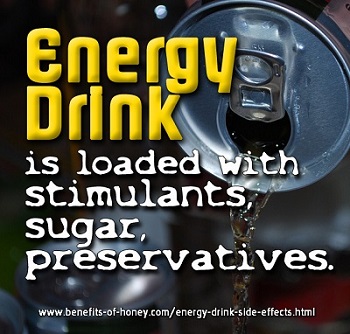
3 Most Harmful Energy Drink Side Effects (Beware!)
Have you given any thoughts to energy drink side effects?
Energy drinks, a new wave of concoctions with big punches of caffeine, sugar, high fructose corn syrup, herbs and other substances are all the rage on campuses, bars and dance clubs. If you haven't got a clue what's happening in these places, then you might have noticed in gas stations and supermarkets the huge fridges dedicated entirely to energy drinks that come in countless innovative variants and flavours. It's astonishing how fast this energy beverage segment is bubbling up.
1. Caffeine Intoxication
Young adults, students are scoring low on their medicinal taste for some of these drinks, but they like the kick from the stimulants, and are drawn to the enticing claims like "provide you a quick lift", "give you more energy", and "improved performance and concentration", with little idea about negative energy drink side effects.

Red Bull contains as much as 80 mg of caffeine per 8-oz can, the equivalent of a cup of coffee, and about twice the amount of caffeine in a can of cola. Australia now requires a warning label on energy drinks: "This food is not recommended for children, pregnant or lactating women and individuals sensitive to caffeine."
Caffeine intoxication can cause restlessness, nervousness, insomnia, and stomach problems. There have been reports on energy drink side effects amongst teenagers who regularly consume carbonated caffeine, dance all nights and stay up until the wee hours of the morning. These kids have experienced dizziness, fainting, and heart palpitations.
Ironically, health experts advise that energy drinks should not be consumed during exercise. The large dose of caffeine and concentrated amount of sugar slow the body's ability to absorb water. Also, energy drinks when mixed with alcohol, poses potential health dangers such as racing heart beat, elevation of blood pressure and even a heart attack. Those who ingest a lot of stimulating caffeine along with a lot of tranquilizing alcohol won't realize how drunk they really are, and can go out to drive a car because of that alert feeling.
2. Sugar Laden Drinks
One of the most harmful ingredients of energy drinks is high fructose corn syrup (HFCS), a highly processed sweetener made from white corn starch. Corn syrup has been linked to many ill-health effects including weight gain, obesity, type 2 Diabetes, and metabolic syndrome, a condition of insulin resistance linked to heart diseases. More details on HFCS in: Sugar is Bad, But is High Fructose Corn Syrup Worse?
3. Citric Acid & Preservatives
In addiiton, these energy drinks are laden with citric acid, sodium citrate to enhance flavor, and preservatives, such as sodium benzoate, potassium sorbate, benzoic acid and sorbic acid to extend shelf life. Regularly consuming these drinks can cause much damage to your teeth and gums and lead to enamel loss, teeth sensitivity and cavities. These additives could also trigger adverse allergic reactions for some people. It has been been reported that consumption of preservative sodium benzoate ovetime could lead to to cell damage and an increase in the production of free radicals in the body (Annual Review of Public Health 2010;31:133-48). Sodium benzoate in combination with Vitamin C can also produce the potent carcinogen benzene.

The FDA admitted that many of the ingredients in most popular energy drinks have not been fully tested. Hence, we simply don't know all the harmful energy drink effects on our health. And when they are consumed over a prolonged period of time, the high levels of certain ingredients that build up in the body can have major or even long term effects on the body.
Other Related Pages
1. Get a healthy, natural energy drink recipe: Honey Lemon Energy Drink.
2. Promises of ginseng honey are an increased physical stamina and vitality, better resistance to stress, and a rejuvenated nervous system: 3 Key Ginseng Honey Facts and Benefits.